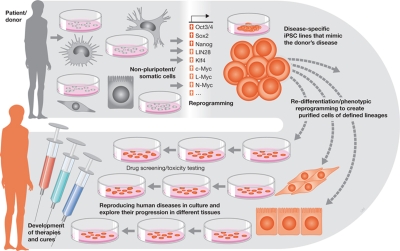Figure 1.
Cellular U-turn-based iPSC applications. Non-pluripotent/somatic cells obtained from a patient/donor can be reprogrammed by using defined factors to generate disease-specific iPSC lines that mimic the donor's disease. They can then be subjected to re-differentiation or phenotypic reprogramming to create purified cells of defined lineages for use in drug screening and toxicity testing, to reproduce human diseases in culture and explore their progression in different tissues, or for the development of therapies and cures.

